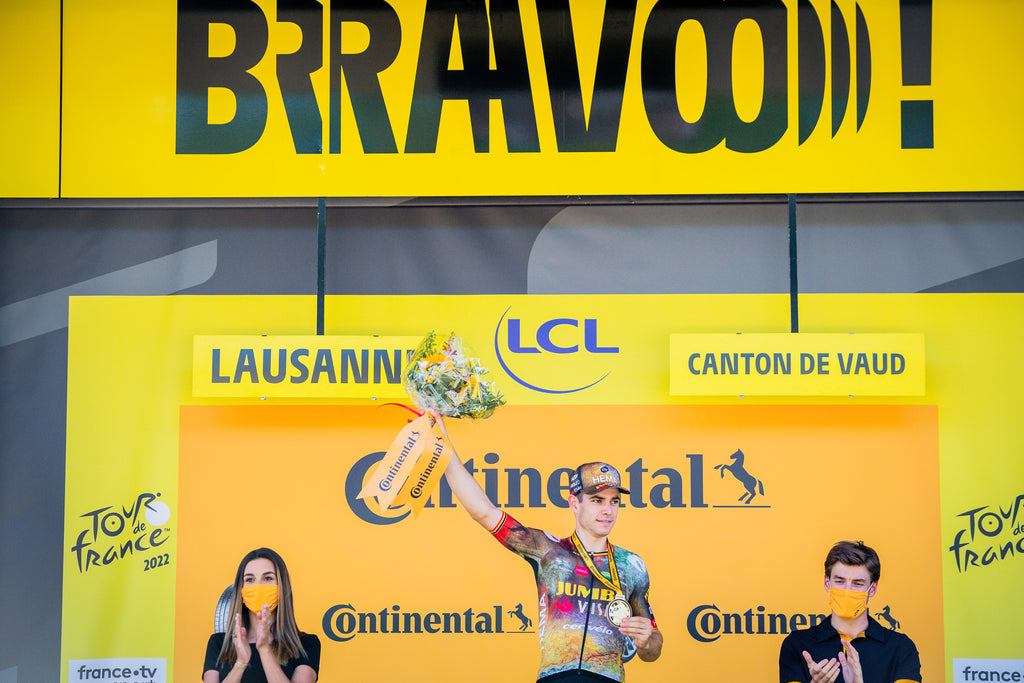The perfect stage: what stage eight of the 2022 Tour de France says about modern cycling
The Lausanne stage of the Tour could have been won by anybody. So of course, Wout van Aert was the victor
The top 10 of stage eight of the 2022 Tour de France contained: Wout van Aert, who can do everything; Michael Matthews, a sprinter/puncheur; Tadej Pogačar, a GC rider; Andreas Kron, whose best results have come from breaks; Alberto Bettiol, a cobbled classics specialist; Aleksandr Vlasov, a GC contender; Benjamin Thomas, a trackie and TT rider; Jonas Vingegaard, a GC rider; Bob Jungels, a rouleur and time triallist; and Thomas Pidcock, the Olympic mountain bike and world cyclo-cross champion.
It was like a cycling party to which everybody had been invited. You could say that not quite all the rider types attended, for there was no pure bunch sprinter, but Wout van Aert was there, and he’s won Tour bunch sprints in the past.
The result said a lot about modern cycling, and about stage design in the modern Tour. There was a time even as recently as the last decade, where all the trends pointed towards increasing specialisation in road racing. Classics riders concentrated on the classics, sprinters sprinted and the climbers climbed. There was little crossover between disciplines, and the ProTour and WorldTour season-long competitions could often be fought out between riders who never actually took part in the same races. (The classic case in point was the 2012 WorldTour, where Bradley Wiggins, who won the Tour, Paris-Nice and the Dauphiné, came up against Tom Boonen, who won the four biggest Belgian classics, and the winner was… Joaquim Rodríguez.)
The Tour’s route design reinforced and reflected this. The turgid Tours of the early noughties would see sprint after sprint after sprint, a couple of long time trials, and mountain stages in which the GC was fought out.
This has completely changed. A generation of riders who are competitive on many different terrains has begotten races which increasingly cater to the spaces which lie between specialities, which has begotten yet more riders who are competitive on many different terrains, and so on.
Stage 8 of the Tour, Dole to Lausanne, may have been the perfect example of the form. At 186.3km with three shortish climbs en route, then an uphill finish, it favoured… everybody. On paper, it initially looked like a day for the break, but two things prevented this from happening. First, a crash split the bunch and rendered it indecisive just as the trio of Matteo Cattaneo, Fred Wright and Frederik Frison were riding off the front. Instead of the expected dozen or so engines, there were just three in the break, and their combined firepower was not enough to stay away, though Wright did survive to the final climb.
Second, this Tour de France has not yet settled. UAE Emirates and Jumbo-Visma, for their own reasons, regulated the break’s lead, and what Ineos Grenadiers, who spent the best part of a decade riding on the front of the bunch, make of it all is anybody’s guess. UAE Emirates seem to be trying to prove to everybody that the criticism of their relative weakness is unfounded. In Jumbo-Visma there are the stirrings of renewed confidence - though many have assumed Pogačar has already got the Tour won, their rider Jonas Vingegaard is only 35 seconds behind despite having suffered terrible luck on the cobbles stage and almost having beaten the Slovenian on La Super Planche des Belles Filles. (Plus, of course, they have Wout van Aert, who obviously liked the look of this stage.) For their part, BikeExchange-Jayco also rode - Matthews was second to Pogačar in Longwy, and could hope to be the only sprinter to survive the climb through Lausanne.
But in a stage which favoured all-rounders, the best all-rounder in the world won. The climb was not quite punchy enough for Matthews, let alone the GC riders, to get rid of Van Aert, and even though the Belgian got a little snarled up in traffic into the final 200 metres, as soon as he had a clear run to the line it was obvious he was the fastest rider there.

There’s one more reason Van Aert won, and that is that UAE Emirates were not strong enough to put him in trouble. The final climb consisted of two ramps, and Bora’s Patrick Konrad set a strong pace up the first. His effort created splits and strung out the lead group. But when UAE’s Rafał Majka took over with 1.5km to go, the group really bunched up behind him. His team had no other options left and nobody else wanted to set the pace, so the resulting lull gave the weaker climbers a chance to recover, sit in the wheels or even move up. The opportunity to drop them came, and went, and then it had gone.
However, this doesn’t at all detract from Van Aert’s victory, and the Belgian’s collection of Tour stages expanded still further in Lausanne, with his second of 2022. He has won bunch sprints, a mountain stage, a time trial, in a solo break on a flat stage (albeit with a hill 10km from the finish as a launchpad) and now he has an uphill puncheurs’ finish in his palmarès. He leads the green jersey competition by over 100 points, and with a lot more of this kind of terrain to come, and few opportunities for second-placed Fabio Jakobson (where Van Aert will also score points anyway), Van Aert just has to finish the Tour to win it.
In fact, the Belgian’s dominance of the green jersey perfectly encapsulates the shift in cycling from specialists to multi-taskers. It used to be a competition for sprinters. Now it’s for the all-rounders, and that is why Van Aert is so far ahead.






























